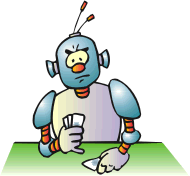For example, you have a model according to which the sun rises each morning, but you cannot be sure that it will rise tomorrow, because it is possible that in the world where you live the sun rises a finite number of times and today was the last sunrise.
That is to say, the task of AI is to find a model of the world and to act according to this model. It is not necessary for the model to be full and to tell everything about the world (we will want to tell more, of course). The model should be reliable, that is to say, it should not contradict the life experience of AI. As there are infinite many models that do not contradict our life experience we will aim to find the simplest one. For example, we will suppose that the sun will rise tomorrow again, because the model in which the sun rises every day is simpler than the model in which the sun rises ten thousand times and then stops.
Another question is whether we consider the function World as determined. Are the numbers from the lottery previously determined in the real world and is it the same about the weather. If they are determined and if we can find the dependency determining them, we could earn well or at least we will know when to take an umbrella and when - not.
According to some people there is fate that determines everything, that is why they accept the fate and get wet in the rain. Other people think that everything can be calculated, that is why they listen to the weather forecast. There is a third group of people who think that these are fortuitous events and for this reason they always have an umbrella.
According to us, it does not matter whether this is determined or not. The only thing that interests us is whether we can foresee it. If something is determined by a very complicated dependency that we cannot understand it will be the same for us if this is fortuitous or not. The conclusion is that we can safely think the function World determined, but to assume that in the world there are phenomena which dependencies are difficultly understood or cannot be understood at all. In the model that we are going to build of the world these phenomena will be modelled as fortuitous.
There is one thing left. It is to tell what will the model of the world look like, how AI will find this model and how by possessing it will plan its actions so, to get a maximum result. Of course, the results will be good if the model is correct or, at least, it is adequate to the world to some extent. For now we will say that the model will consist of finite automata. Among the automata we will also use undetermined ones, in order to describe the fortuitous events.
The question what a finite automata is and how it could be the model of the world goes beyond the limits of this paper but the readers can take interest themselves and to find literature on this topic. A better studied question is that how the computer can plan its actions when it already has a model of the world. The most popular algorithm is the so-called Min-Max algorithm that is at the base of the play- chess programs. If the reader is interested how the computer thinks through Min-Max we would advise him to take a look at the program Strawberry Prolog that is on the CD enclosed to this magazine. There in the examples are a few games (Tick-Tack-Toe, Checkers and others) that use the algorithm Min-Max.

